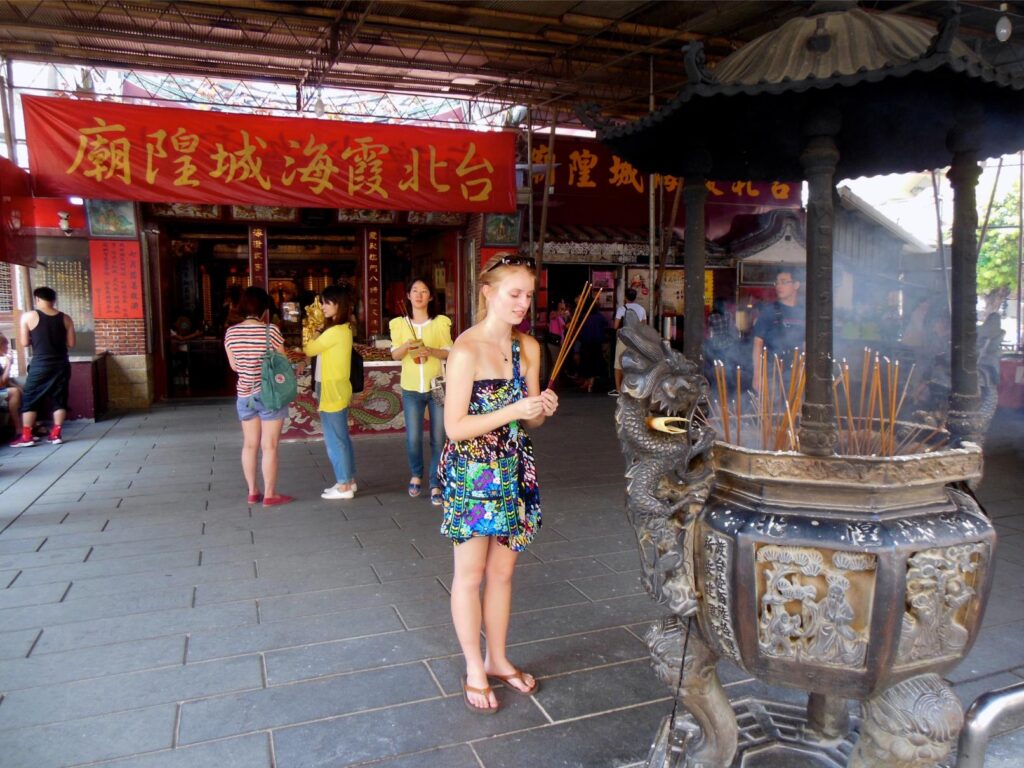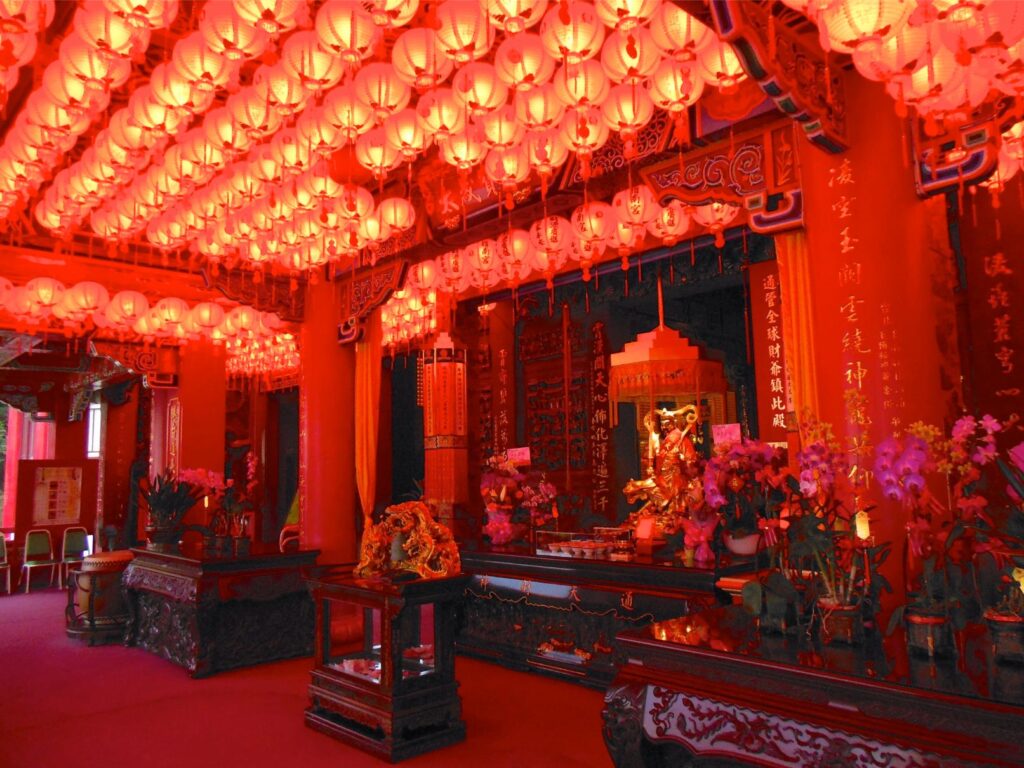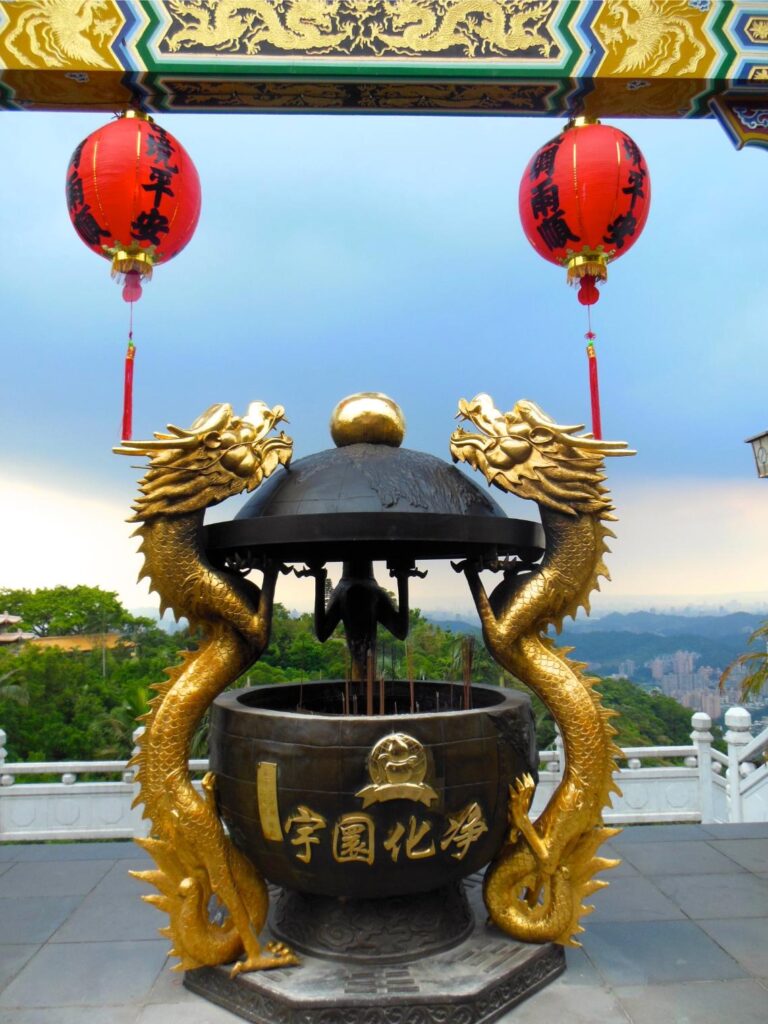
Luck plays a huge role in Chinese culture, so there are so many ways to say “good luck” in Chinese! Of course, there’s the basic way to say it (I’ll introduce that first), but if you want to sound like a native, that’s not all you need to know!
Chinese culture is so rich in expressions, I’ll actually be introducing 34 expressions for all sorts of situations! I’ll also give some nifty 成语 (chéngyǔ), or four-character idioms that reveal a lot about Chinese culture. And I can tell you, having studied Chinese at university and then worked in Taiwan, these do come in handy!
And don’t worry if you’ve studied simplified or traditional characters – or if you’re still relying on pinyin because you’re not sure how to read Chinese characters. I’ve got them all included for every phrase!


General Ways to Wish Good Luck in Chinese
Let’s start with some general good luck phrases in Chinese that you can use in nearly any kind of situation.
祝你好运 / 祝你好運 (zhù nǐ hǎo yùn)
Meaning: Wishing you good luck
This is the most straightforward way to wish someone good luck in Chinese. While it’s a direct translation of the English phrase, native speakers often use more specific expressions tailored to the situation. These are up next!
加油 (jiā yóu)
Meaning: Keep it up / Go for it!
加油 is a versatile and widely used phrase in Chinese. Literally meaning “add oil,” it’s used to encourage someone or cheer them on. You’ll hear this phrase often in various contexts, from sports events to everyday challenges.
我给你加油 / 我給你加油 (wǒ gěi nǐ jiā yóu)
Meaning: I’m rooting for you
This expression takes 加油 (right above) a step further by personalizing the encouragement. It’s a great way to show your support for someone facing a challenge or pursuing a goal.
祝你顺利 / 祝你順利 (zhù nǐ shùn lì)
Meaning: I hope everything goes well
This phrase is perfect for wishing someone smooth sailing in their endeavors. It can be used for everything from exams to job interviews to travel plans.
These general phrases provide a solid foundation for expressing good luck in Chinese. Next, let’s check out more specific expressions tailored to different occasions and life events.
Good Luck for Specific, Everyday Situations
Okay, so let’s go deeper in our ways to wish someone luck in Chinese. In Chinese culture, there are many expressions for well-wishing related to studies, work, health, and more!
Academic Success
Need to wish a student good luck in Chinese? Here are some special ways to do it!
好好儿考啊 / 好好兒考啊 (hǎo hǎor kǎo a)
Meaning: Have a good exam
This casual expression is perfect for wishing a friend or classmate good luck before an exam. It’s friendly and encouraging, commonly used among students.
祝你学业成功 / 祝你學業成功 (zhù nǐ xué yè chéng gōng)
Meaning: Well-wishes for academic success
Use this phrase to wish someone success in their overall studies, not just for a single exam. It’s suitable for long-term academic pursuits, like starting a new school year or degree program.
祝你金榜题名 / 祝你金榜題名 (zhù nǐ jīn bǎng tí míng)
Meaning: May you pass the examination
The final four-character idiom (known as a 成语 chéngyǔ) of this phrase literally means “May your name be listed on the golden roster.” It’s a more formal and traditional way to wish someone success in their exams, often used for important tests like college entrance exams.
Career and Work
Right, so someone you know has finished studying and is moving on to work, and you want to wish them good luck in Chinese! Here are phrases you can use with friends, colleagues, neighbors, or anyone else you know working hard!
好好儿干啊 / 好好兒幹啊 (hǎo hǎor gàn a)
Meaning: Do well on this task/job
Similar to the exam-related phrase, this expression is used to encourage someone to perform well in their work. It’s casual and supportive, ideal for colleagues or friends.
祝你事业顺利 / 祝你事業順利 (zhù nǐ shì yè shùn lì)
Meaning: Wishing you a successful career
This phrase is perfect for long-term career wishes, such as when someone starts a new job or launches a business venture.
祝你工作成功 (zhù nǐ gōng zuò chéng gōng)
Meaning: Well-wishes for job success
Use this expression to wish someone success in their specific job or work-related task. It’s more targeted than the general career wish.
马到成功 / 馬到成功 (mǎ dào chéng gōng)
Meaning: May you immediately meet with success
This four-character idiom literally means “success upon the horse’s arrival.” It’s used to wish someone quick success in their endeavors, especially in business or career contexts.
步步高升 (bù bù gāo shēng)
Meaning: May you continuously get promoted
Another four-character idiom, this phrase wishes for continuous career advancement. It’s particularly suitable for congratulating someone on a promotion or wishing them future career growth.
Health and Well-being
Of course, health is another aspect of life where good luck is important in Chinese! Here’s how to specifically wish someone good health.
祝你身体健康 / 祝你身體健康 (zhù nǐ shēn tǐ jiàn kāng)
Meaning: May your body be healthy and strong
This is a common phrase used to wish anyone good health and therefore is suitable for various occasions.
祝你长命百岁 / 祝你長命百歲 (zhù nǐ cháng mìng bǎi suì)
Meaning: May you live a long and healthy life
Often used for elders, this phrase wishes for longevity. It’s particularly appropriate for birthdays or during Chinese New Year celebrations.
祝你福寿安康 / 祝你福壽安康 (zhù nǐ fú shòu ān kāng)
Meaning: Good fortune, safety, and health
This comprehensive well-wish combines hopes for fortune, longevity, peace, and health. It’s a respectful and formal way to express good wishes, especially to elders or in more formal settings.
By the way, there are many more ways to wish someone a happy new year! Check out our specific article on wishing “Happy New Year” in Chinese, giving you a whopping 15 ways to do it!
Good Luck for Special Occasions
Okay, so we’ve gone over how to wish someone good luck in Chinese for everyday occasions. Now, let’s look at more special occasions! In Chinese culture, special occasions call for specific well-wishes. Let’s explore some good luck expressions for weddings, birthdays, and other celebrations.
Weddings
If you know someone getting married, you’ll definitely want to tell them well wishes in Chinese! Here’s how to do it for the happy couple.
祝你们幸福 / 祝你們幸福 (zhù nǐ men xìng fú)
Meaning: I wish you (both) happiness
This simple yet heartfelt phrase is perfect for wishing newlyweds a happy life together. It’s versatile and can be used in both formal and informal settings.
祝你们百年好合 / 祝你們百年好合 (zhù nǐ men bǎi nián hǎo hé)
Meaning: I wish you a long life together
Literally wishing the couple “a good match for a hundred years,” this phrase expresses hope for a lasting and harmonious marriage.
白头偕老 / 白頭偕老 (bái tóu xié lǎo)
Meaning: May you grow old together
This four-character idiom paints a poetic image of a couple growing old together, with white hair. It’s a beautiful way to wish for a long-lasting marriage.
多子多孙 / 多子多孫 (duō zi duō sūn)
Meaning: May you have many children and grandchildren
In Chinese culture, having numerous descendants is considered a blessing. This phrase wishes the couple a large and prosperous family.
激情永在 (jī qíng yǒng zài)
Meaning: May you have everlasting passion
This more modern expression wishes the couple enduring love and passion in their marriage.
早生贵子 / 早生貴子 (zǎo shēng guì zǐ)
Meaning: May you give birth to a child soon
Traditionally used to wish for a son, this phrase is now generally used to wish for children. Use it cautiously, as some couples might prefer not to discuss family planning, just like in Western culture nowadays.
Birthdays
Everyone has a birthday, so here’s how you express well wishes in Chinese year-round!
生日快乐 / 生日快樂 (shēng rì kuài lè)
Meaning: Happy birthday
This is the standard way to wish someone a happy birthday in Chinese. It’s simple, direct, and suitable for all ages.
祝你天天快乐,心想事成 / 祝你天天快樂,心想事成 (zhù nǐ tiān tiān kuài lè, xīn xiǎng shì chéng)
Meaning: Wishing you daily joy and success
This longer birthday wish combines hopes for daily happiness and the fulfillment of one’s wishes. It’s a warm and comprehensive birthday blessing. Since it’s a bit fluffy, keep it in your back pocket for speeches, maybe.
New Year and Other Celebrations
In Chinese culture, there are two new years, so here are two ways to send someone well wishes in Chinese for the dawn of a new year!
恭喜发财 / 恭喜發財 (gōng xǐ fā cái)
Meaning: May you be prosperous
Commonly used during Chinese New Year, this phrase wishes for prosperity and good fortune. It’s also used as a general congratulatory expression.
新年快乐 / 新年快樂 (xīn nián kuài lè)
Meaning: Happy New Year
This is the standard way to wish someone a happy New Year, used for both the lunar and solar new year celebrations.
Good Luck for Wealth and Prosperity
In Chinese culture, wishing someone good fortune often includes hopes for financial success and prosperity, as we’ve seen in some of the expressions above! These phrases are commonly used during business dealings, career advancements, or general well-wishes for a prosperous future.
Here are some popular expressions, followed by a short discussion about their appropriateness in different contexts.
祝你财源广进 / 祝你財源廣進 (zhù nǐ cái yuán guǎng jìn)
Meaning: May your wealth multiply
This phrase literally means “May your sources of wealth be wide and your progress never-ending.” It’s a powerful blessing wishing for exponential growth in financial resources. This expression is suitable for business partners, colleagues, or friends starting new ventures.
祝你财运亨通 / 祝你財運亨通 (zhù nǐ cái yùn hēng tōng)
Meaning: Wishing you smooth financial luck
This phrase combines wishes for both wealth (财/財 cái) and luck (运/運 yùn). So use this when you want to wish someone not just wealth, but also the good fortune to manage it well.
祝你财源滚滚 / 祝你財源滾滾 (zhù nǐ cái yuán gǔn gǔn)
Meaning: A steady stream of wealth
Imagine wealth pouring in like an unstoppable waterfall – that’s the image this phrase evokes. 滚滚/滾滾 (gǔn gǔn) gives a sense of continuous, rolling motion, suggesting an constant inflow of wealth. This vivid expression is perfect for wishing someone ongoing financial success.
These financial good luck wishes reflect the importance of prosperity in Chinese culture. They’re often used during Chinese New Year, at business openings, or when congratulating someone on a new job or promotion. While they focus on material wealth, they’re seen as positive wishes for overall well-being and success in life.
When using these phrases, it’s important to consider the context and your relationship with the person. In more formal or business settings, these wishes for financial prosperity are generally well-received. However, in personal relationships, you might want to balance these with wishes for health and happiness as well.
Remember, in Chinese culture, talking about money and wishing for wealth is not considered taboo as it might be in some Western cultures. These expressions are seen as genuine wishes for a person’s overall success and well-being.
Additional Good Luck Phrases
In addition to situation-specific expressions, there are several versatile phrases in Chinese that can be used to wish someone good luck or express good wishes in various contexts. Let’s explore some of these:
一路顺风 / 一路順風 (yí lù shùn fēng)
Meaning: Bon voyage
Literally translating to “may the wind be favorable all the way,” this phrase is commonly used when someone is about to embark on a journey. However, it can also be used metaphorically for someone starting a new venture or phase in life. So it’s like a wish for smooth sailing, whether in travel or in life’s journey.
保重 (bǎo zhòng)
Meaning: Take care
This simple yet meaningful phrase is often used when parting ways, especially if you won’t see the person for a while. Or it’s alternatively used if someone’s not feeling well. It shows your concern for their well-being and is a gentle way of wishing them good luck in taking care of themselves.
寿比南山,福如东海 / 壽比南山,福如東海 (shòu bǐ nán shān, fú rú dōng hǎi)
Meaning: May you live as long as the Southern Mountain and have fortune as boundless as the eastern sea
What a phrase, eh? We see that this poetic expression combines wishes for longevity and good fortune. It’s a more elaborate and formal way to extend good wishes, sometimes used in birthday greetings, especially for elders. The phrase draws on the imagery of enduring mountains and vast seas to emphasize the depth and breadth of the well-wishes.
Good Luck Symbols and Animals in Chinese Culture
While Chinese is rich in phrases, it’s also got a wealth of symbols for good luck! Here are a few noteworthy examples:
Good Luck Symbols and Signs
Here are some general lucky signs and symbols in Chinese culture.
- 红色 / 紅色 (hóng sè): The color red – this is associated with luck, happiness, and prosperity.
- 八 (bā): Number 8 – like the lucky number 7 in Western culture, 8 is considered very lucky in Chinese culture.
- 玉 (yù): Jade – this is believed to bring good health and protection.
- 竹 (zhú): Bamboo – this symbolizes growth, strength, and resilience.
- 钱币 / 錢幣 (qián bì): Coins, especially old Chinese coins with square holes (方孔钱 / 方孔錢 fāng kǒng qián). These are good luck symbols in Chinese culture (think of the beckoning cat at many storefronts!)
- 鸳鸯 / 鴛鴦 (yuān yang): Mandarin ducks – which symbolize love and marital harmony.
- 牡丹 (mǔ dan): Peonies – these represent wealth and honor.
Lucky Animals
Of course, there are many animals that represent good luck in Chinese culture, as well as fortune, and more! Here are some of the most famous examples.
- 龙 / 龍 (lóng): Dragon, symbol of power, strength, and good fortune.
- 凤凰 / 鳳凰 (fèng huáng): Phoenix, represents virtue and grace.
- 虎 (hǔ): Tiger, symbolizes strength and bravery.
- 蝙蝠 (biān fú): Bat, its name sounds similar to 福 (fú, “fortune”). (The Chinese love puns!)
- 仙鹤 / 仙鶴 (xiān hè): Crane, symbolizes longevity.
- 锦鲤 / 錦鯉 (jǐn lǐ): Koi fish, represents perseverance and success.
- 金鲤鱼 / 金鯉魚 (jīn lǐ yú): Golden carp, associated with abundance and perseverance.
- 乌龟 / 烏龜 (wū guī): Tortoise, symbolizes longevity and wisdom.
Chinese Zodiac Animals (生肖 / 生肖 shēng xiào):
You may have noticed that many of the Chinese good luck animals are members of the Chinese zodiac, or 生肖 (shēng xiào)! This is Chinese astrology. If you’re less familiar, the animals are:
- 鼠 (“shǔ*, Rat)
- 牛 (niú, Ox)
- 虎 (hǔ, Tiger)
- 兔 (tù, Rabbit)
- 龙/龍 (lóng, Dragon)
- 蛇 (shé, Snake)
- 马/馬 (mǎ, Horse)
- 羊 (yáng, Goat)
- 猴 (hóu, Monkey)
- 鸡/雞 (jī, Rooster)
- 狗 (gǒu, Dog)
- 猪/豬 (zhū, Pig).
In Chinese culture, while all zodiac animals have their own characteristics and strengths, some are traditionally considered luckier than others. Here’s an overview:
龙 / 龍 (lóng) – Dragon:
Considered the most auspicious and powerful of all zodiac signs, dragons are associated with strength, success, and good fortune.
虎 (hǔ) – Tiger:
Regarded as brave and lucky, especially for warding off evil spirits.
兔 (tù) – Rabbit:
Known for bringing good luck in business and relationships.
猪 / 豬 (zhū) – Pig:
Associated with wealth, honesty, and good fortune.
鼠 (shǔ) – Rat:
The first animal in the zodiac cycle, rats are seen as clever and associated with wealth.
(Unfortunately, my sign, the Rooster, does not fall into the super lucky list.)
It’s important to note that according to the Chinese zodiac, luck can vary depending on the year. Each zodiac animal’s luck can change based on the current year’s zodiac sign and other astrological factors.
The phrase for when your year comes is 本命年 (běn mìng nián). Contrary to what some might expect, the year of one’s own zodiac animal is traditionally considered a challenging year, requiring extra caution rather than being especially lucky.
Also, personal birth years matter. An individual’s luck is often tied to their own zodiac sign and its relationship with the current year’s sign.
Likewise, compatibility plays a role. Some zodiac signs are considered more compatible and thus “luckier” when paired together!
And did you know that cultural variations exist? Different regions within China and other East Asian countries may have slightly different interpretations of which animals are luckiest.
Chinese Astrology and Feng Shui:
Closely related to astrology and the zodiac, we have Feng Shui (风水 / 風水, fēng shuǐ). This is an ancient Chinese practice that aims to harmonize individuals with their surrounding environment. It involves arranging living and working spaces to optimize the flow of qi (气 / 氣, qì), or life force energy, based on principles of balance and the interaction of the five elements (五行, wǔ xíng). Practitioners believe that proper Feng Shui can bring good fortune, health, and prosperity, while poor feng shui can lead to misfortune and distress.
Now, Feng Shui and Chinese astrology are related, but they are distinct practices within traditional Chinese metaphysics. Here’s a brief explanation of their relationship.
Both Feng Shui and Chinese astrology are based on the same fundamental concepts of Chinese philosophy, including:
- Yin and Yang (阴阳 / 陰陽, yīn yáng) – The concept of balance between opposing forces.
- Five Elements (五行, wǔ xíng) – These are 木 (mù, Wood), 火 (huǒ, Fire), 土 (tǔ, Earth), 金 (jīn, Metal), and 水 (shuǐ, Water).
- Qi (气 / 氣, qì) or life force energy
Feng Shui often incorporates astrological elements to determine auspicious dates, directions, and placements. For example:
- A person’s birth date (determined by astrology) might influence their lucky directions (吉祥方位, jí xiáng fāng wèi) in Feng Shui.
- Astrological calculations might be used to choose favorable dates for implementing Feng Shui changes.
But Feng Shui primarily deals with the arrangement of physical spaces and objects
Chinese astrology focuses on time cycles and their influence on personal characteristics and destiny
While they are separate disciplines, Feng Shui and Chinese astrology are often used together in traditional Chinese practices to provide a comprehensive approach to harmonizing one’s life with the natural and cosmic forces believed to influence human affairs.
Now, let me explain this concept in more detail.
In Chinese feng shui, certain directions are believed to be more auspicious or lucky for individuals based on various factors, including:
- Their birth year
- Their zodiac sign
- The current year
- The layout of their home or office
Feng shui typically considers eight main directions:
- 东 / 東 (dōng): East
- 南 (nán): South
- 西 (xī): West
- 北 (běi): North
- 东北 / 東北 (dōng běi): Northeast (Notice Chinese literally says “Eastnorth,” and similar patterns below!)
- 东南 / 東南 (dōng nán): Southeast
- 西南 (xī nán): Southwest
- 西北 (xī běi): Northwest
People might use these lucky directions to determine:
- The orientation of their bed
- Where to place important furniture
- Which direction to face when working or studying
- The direction to travel for business or pleasure
Also, an individual’s lucky directions are often calculated based on their birth date using the Ba Zhai (八宅 bā zhái) system or other Feng Shui methods.
Frequently Asked Questions
Now, before I wrap up, to help you further understand and use these good luck expressions in Chinese, here are answers to some common questions. Consider this a recap of what we learned today!
Q1: How do you wish someone luck in Chinese?
A: The most straightforward way is to say 祝你好运 (zhù nǐ hǎo yùn), which directly translates to “wish you good luck.” However, Chinese speakers often prefer more specific phrases tailored to the situation, such as 加油 (jiā yóu) for general encouragement or 祝你成功 (zhù nǐ chéng gōng) for wishing success.
Q2: What is the Chinese word for good fortune?
A: The Chinese character for good fortune or luck is 福 (fú). This character is often seen in decorations, especially during Chinese New Year. It’s used in phrases like 祝你福寿安康 (zhù nǐ fú shòu ān kāng), wishing someone good fortune, longevity, and health.
Q3: How to pronounce these good luck phrases correctly?
A: Chinese is a tonal language, which can make pronunciation challenging for non-native speakers. Here are some tips:
- Pay attention to the pinyin, especially the tone marks.
- Listen to native speakers or use language learning apps with audio features.
- Practice regularly, focusing on the tones and rhythm of the phrases.
Q4: Are these phrases used in all Chinese-speaking regions?
A: While most of these phrases are widely understood across Chinese-speaking regions, there might be slight variations in usage or preference between Mainland China, Taiwan, Hong Kong, and other Chinese-speaking communities.
Q5: Is it appropriate to use elaborate good luck phrases in casual conversations?
A: It depends on the situation and your relationship with the person. In casual settings with friends, simpler phrases like 加油 (jiā yóu) are often more appropriate. More elaborate phrases are typically reserved for formal occasions or when addressing elders.
Q6: Can I use these phrases in written communication, like emails or messages?
A: Absolutely! Many of these phrases are commonly used in written form. But in professional settings, it’s best to stick to more formal expressions unless you have a close relationship with the recipient.
Good Luck Learning Chinese!
As we’ve explored in this comprehensive guide, there are numerous ways to say “good luck” in Chinese, each tailored to specific situations or occasions. Some key points to remember:
-
- Context matters: Choose your expression based on the specific situation, relationship, and level of formality.
- Cultural awareness: Many Chinese good luck phrases reflect deeply held cultural values, such as the importance of family, respect for elders, and the pursuit of prosperity.
- Versatility: While some phrases are situation-specific, others like 加油 (jiā yóu) can be used in various contexts to offer encouragement.
- Poetic nature: Chinese good luck expressions often draw on poetic imagery and idiomatic phrases. This can potentially add depth and beauty to your well-wishes. The flowery language is often more commonly used in Chinese culture than in English-speaking cultures.
- Sincerity: Regardless of which phrase you choose, the most important aspect is the genuine sentiment behind your words. (Sarcasm is a universal language, so be careful!)
By incorporating these phrases into your Chinese language repertoire, you’ll not only improve your language skills but also deepen your cultural understanding. Whether you’re a language learner, a business professional working with Chinese colleagues, or simply someone interested in Chinese culture, these expressions will help you connect more meaningfully with native speakers.
So don’t hesitate to put these expressions into practice. With time and use, you’ll find yourself naturally integrating these good luck wishes into your Chinese conversations, spreading positivity and goodwill in a culturally resonant way.
祝你学习进步,越来越棒!(zhù nǐ xué xí jìn bù, yuè lái yuè bàng!)
Wishing you progress in your studies and continuous improvement!


